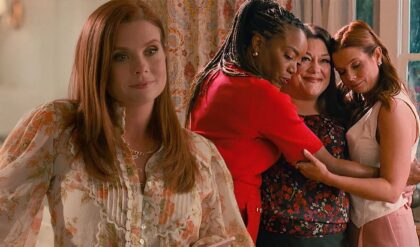
When it comes to thought-provoking television shows, there are few that nail the formula quite like Black Mirror. The Netflix series’ fourth season recently premiered, and it looks like that tradition is still going strong. One episode that has drawn particular attention is Jodie Foster’s “Arkangel,” which examines the ethical implications of a mother using technology to keep track of her child. During a roundtable discussion at a Netflix press event to talk about her work on Black Mirror, Foster revealed that she was drawn to Black Mirror because of the way “Arkangel” approached feminism and humanity instead of merely condemning technology itself, saying this:
Yeah. I mean that’s what Black Mirror is. It’s not really a condemnation of technology and what it’s done to our culture. It’s just the opposite, which is we have invented this thing that is emotionless and it is a reflection and enhances our own psychological issues. That, to me, what was interesting was how it highlighted all of these foundational feminist problems that we have as women and who we are. In terms of the mother’s character, it’s clear that she doesn’t have a high opinion of herself. That she is ashamed of who she’s been in the past and what her life ended up being. Dominated by a very, somewhat nasty dad who didn’t have a lot of respect for her. Weird messed up relationships with men, but here she’s found a vessel. She’s found this beautiful thing that is everything she could ever want to be and not only can she control her experience so she can create the best monster, but she also gets to get inside of her face and look out through her eyes and have the experience of being this beautiful powerful thing. So for me, that’s kind of like combining a Bergman movie with a movie thinking about technology.
As pointed out by Jodie Foster, Black Mirror doesn’t really come down hard one way or the other in its examination of technology. Instead, “Arkangel” uses an ethical discussion about technology and its uses in parenting to make a broader point about the pressures of motherhood and the need for control in a world that arguably hasn’t been kind towards women. It’s not that the mother using the technology to monitor her child has worrisome implications; it’s that society pushed the mother to the point at which she felt the need to use the technology.
From there, Jodie Foster explained how “Arkangel” required her to examine the dark side of parenting and human nature, and that she connected with the material because she had felt it at various times during her own experience as a mother. Foster continued:
There’s sort of a seminal moment where her daughter starts lying to her for the first time and we know she’s lying, and then we also know that the mom lies back to her. That’s like a fissure. There’s a moment in the film where everything changes from that moment on. Then she has to, like a warrior, say ‘I’m going to do this terrible thing you’re not going to like if you knew what it was, but I am going to do it for your own good.’ There is a methodical, it’s almost an out of body thing like ‘I am a warrior and I will blow up hundreds of villagers in order to save this most important thing.’ I don’t know. I feel like I’ve seen that in my mom and maybe I’ve even seen it in myself. It’s a darker side of us.
This revelation certainly seems to line up with other recent remarks made about “Arkangel.” More specifically, Black Mirror creator Charlie Brooker recently spoke out about the episode, and what Jodie Foster brought to it, and admitted that she was willing to engage with the material and add her unique point of view as an artist and as a woman. Given Foster’s comments about Black Mirror at the press day and her experience as female heroes in projects like The Brave One, The Accused, and Panic Room, that seems to make sense.
The fourth season of Black Mirror is now available to stream on Netflix. Beyond the tech-based thriller series, you can also check out our midseason premiere guide to see what other shows are set to debut soon and listen to our latest episode of The Cord Cutter Podcast to hear our thoughts on the latest and greatest streaming content.




